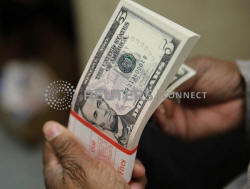Dollar heads for longest weekly losing streak in a
decade
 Send a link to a friend
Send a link to a friend
 [August 14, 2020] By
Ritvik Carvalho [August 14, 2020] By
Ritvik Carvalho
LONDON (Reuters) - The dollar steadied on
Friday as a spike in U.S. bond yields and a drag on risk sentiment from
lacklustre Chinese economic data slowed a selldown of the U.S. currency,
which was headed for its longest weekly losing streak since 2010.
China's retail sales unexpectedly extended their fall into a seventh
month in July and industrial output missed expectations - suggesting
bumps in even the world's most promising rebound.
The mood had the dollar within reach of snapping a seven-week losing
streak against the risk-sensitive Aussie <AUD=D3>, which settled around
$0.7149, flat for the week.
Tepid demand in a long-dated U.S. government bond auction on Thursday
also extended a surge in Treasury yields that has drawn some investors -
especially from Japan - back to dollars.

"Mixed tone across FX markets at the end of the week as investors lack a
clear directional catalyst in these quiet summer markets," said Viraj
Patel, FX and global macro strategist at Arkera.
U.S. retail sales data today may inject a bit of impetus, said Patel -
especially as it will test the narrative that the U.S. economy will lag
in the post-pandemic recovery.
"Dollar crosses will continue to be driven by U.S. yields and whether
the corrective move higher - and mini U.S. bond market tantrum -
continues into next week," Patel said.
The yen <JPY=> was on course for its poorest week against the dollar in
two months and down about 0.9% at 106.74 from last Friday's close.
The biggest loser this week has been the kiwi <NZD=D3>, which was under
pressure at $0.6538, as New Zealand deals with a fresh coronavirus
outbreak. Moreover, the central bank this week flagged increased bond
buying and again mentioned the prospect of negative rates.
Against a basket of currencies <=USD>, the U.S. dollar remains 0.2%
lower for the week, but it seems to have arrested a slide that has it
about 9.5% below its March peak. The dollar index was headed for its
eighth consecutive week of losses, its longest weekly losing streak
since June 2010.
DIVERGENCE
Preliminary European employment and GDP numbers due at 0900 GMT and U.S.
retail sales figures at 1230 GMT are the next set of data for investors
to parse for signs of divergence between the U.S. and European
recoveries.
[to top of second column] |

A packet of former U.S. President Abraham Lincoln five-dollar bill
currency is inspected at the Bureau of Engraving and Printing in
Washington March 26, 2015. REUTERS/Gary Cameron

Gathering faith in Europe's rebound, and concerns about the U.S.
response as the virus spreads and politicians remain deadlocked over the
next relief package, have kept the euro firm even as the dollar has been
able to bounce a bit elsewhere.
A fall last week in the number of applications for unemployment benefits
in the United States to below one million provided a note of cheer but,
with some 30 million out of work and stimulus plans stalled, the outlook
remains grim.
The euro <EUR=EBS> slid 0.1% to $1.1806 in early London deals on Friday
and the pound <GBP=D3> was a shade higher at $1.3072, as investors
sought to focus on a rebound in growth in June rather than a stunning
20% quarterly contraction.
Another element of divergence has opened between Australia and New
Zealand, whose central banks are striking quite a different tone.
The Reserve Bank of New Zealand (RBNZ) sparked a bond rally this week by
promising to extend its own purchases and, next week, speed them up as
well.
But while the RBNZ talked about sub-zero rates, Reserve Bank of
Australia Governor Philip Lowe reiterated on Friday that fiscal support
was what was needed.
"The key takeaway from the RBNZ meeting is that they’re preparing more
loosening measures to use if necessary, including not only negative
rates but also buying foreign assets – a deliberate effort to weaken the
currency," said Marshall Gittler, head of investment research at BDSwiss.

"The market is just doing it for them, thereby saving the RBNZ some
money."
(Reporting by Ritvik Carvalho; additional reporting by Tom Westbrook in
Singapore; Editing by Kevin Liffey)
[© 2020 Thomson Reuters. All rights
reserved.] Copyright 2020 Reuters. All rights reserved. This material may not be published,
broadcast, rewritten or redistributed.
Thompson Reuters is solely responsible for this content. |